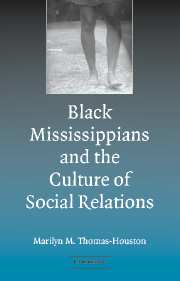Book contents
- Frontmatter
- Contents
- Preface
- Acknowledgments
- Introduction
- PART ONE THE CULTURAL HISTORY AND SOCIAL STRUCTURE OF THE REGION
- PART TWO SOCIAL CONSCIOUSNESS, SOCIAL ACTION
- PART THREE CONSTRUCTION OF AN INTRARACIAL IDENTITY
- Conclusion
- Appendix A Lafayette County Population Chart
- Appendix B Proclamation Honoring Ole Miss Demonstrators
- Appendix C Chancellor's Statement of Commendation
- Appendix D Speech by Susie Marshall for Second Baptist Church Honoring Rev. Blind Jim Ivy
- Appendix E Susie Marshall's Unpublished Draft of Freedman Town Marker Dedication Speech Recounting July 4, 1867, Speech of Oxford Ex-slave
- Bibliography
- Index
Appendix D - Speech by Susie Marshall for Second Baptist Church Honoring Rev. Blind Jim Ivy
Published online by Cambridge University Press: 23 December 2009
- Frontmatter
- Contents
- Preface
- Acknowledgments
- Introduction
- PART ONE THE CULTURAL HISTORY AND SOCIAL STRUCTURE OF THE REGION
- PART TWO SOCIAL CONSCIOUSNESS, SOCIAL ACTION
- PART THREE CONSTRUCTION OF AN INTRARACIAL IDENTITY
- Conclusion
- Appendix A Lafayette County Population Chart
- Appendix B Proclamation Honoring Ole Miss Demonstrators
- Appendix C Chancellor's Statement of Commendation
- Appendix D Speech by Susie Marshall for Second Baptist Church Honoring Rev. Blind Jim Ivy
- Appendix E Susie Marshall's Unpublished Draft of Freedman Town Marker Dedication Speech Recounting July 4, 1867, Speech of Oxford Ex-slave
- Bibliography
- Index
Summary
This is how the story is told in the words of Rev. Blind Jim Ivy.
The son of Matilda Ivy, James Ivy, was brought to Oxford, Lafayette County, with his mother in early childhood. His mother, Matilda, was one of the ex-slave women who formed the nucleus of the first Colored Baptist Church, now Second Baptist, in 1869. He was brought up in this church and ordained to preach the gospel. In a whirlwind courtship he married Blind Rosa Sanders and lived across the street from Second Baptist Church. Blind Jim as he was called said that he was blinded while working […] on the Tallahatchie Bridge when he was a teenager.
Being members of Second Baptist, Rev. Blind Jim would always lead the opening of the worship on Sunday at eleven o'clock services by singing “Let the Heaven Light Shine on Me.”
Blind Jim became a part of the University of Mississippi in 1896. It is said that while selling peanuts at one of the football games he loudly cheered, “Hey! We're gonna beat ‘em.” After that event the students honored him as mascot of the football team and also honored him as Dean of the freshmen class. Blind Jim was loved by the students who took him with them to all the out of town football games where he cheered for the team and sold peanuts. He often would comically say, “I've never seen Ole Miss lose a football game.
- Type
- Chapter
- Information
- 'Stony the Road' to ChangeBlack Mississippians and the Culture of Social Relations, pp. 199Publisher: Cambridge University PressPrint publication year: 2004

